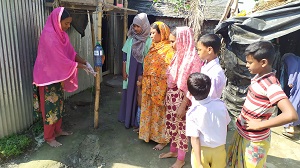|
Name of the project: Nutrition Awareness and Support Services (NASS)
Duration: 3 years
Funded by: World Bank
Managed by: Social Development Fund (SDF) of Ministry of Finance, Bangladesh
Implementation area: (Geographical Coverage): 175828 poor extreme poor households in 1050 villages at 15 upazilas across 5 districts
Target audience/ beneficiaries (if any specific):
|
NASS is a component of Nuton Jibon Livelihood Improvement Project (NJLIP) of Social Development Foundation (SDF) of the Bangladesh Ministry of Finance. NASS component has been implemented by Partners in Health and Development (PHD) in Mymensing Region covering 15 upazilas of 5 districts. The project is funded by World Bank and The People’s Republic of Bangladesh. Aim The project aims to raise awareness, improve attitudes and practices that enhance nutritional outcomes for targeted beneficiaries and to support them in optimizing nutrition through their livelihood activities. Outcomes The project is expecting 6 specific outcomes:
To achieve the outcomes, the project focuses on the following outputs:
Locally Invented Low-Cost Hand Wash Station (Tippy Taps) To encourage hygiene and hand washing behavior at house hold level, NASS has provided locally invented low-cost hand wash station for the targeted HHs. A total of 175,828 Tippy taps have been provided and setup at household of 1,050 villages. This is to encourage community to habituate to wash hand with soap and water in critical time maintaining six steps. It is made by a plastic water bottle which is available everywhere in the country. Taps are provided as symbol to remind the members of the target household to wash their hands at six critical times. Regular follow-up and counseling through home visit and conducting BCC sessions by project field staff and NSC on personal hygiene and sanitation. Children and adolescent take it as very interesting to themself as it is a new and easy way to wash their hands. By the continuous follow up, counseling and replacement of Tippy Taps by the household with available plastic bottles, communities are well adopted in improve hygiene and sanitation practices. Which is essentially needed during the current outbreak of COVID19 too. |

